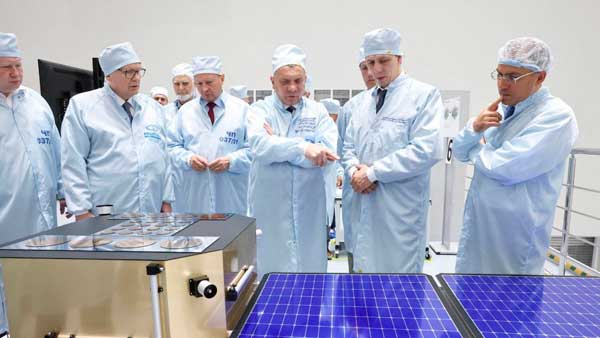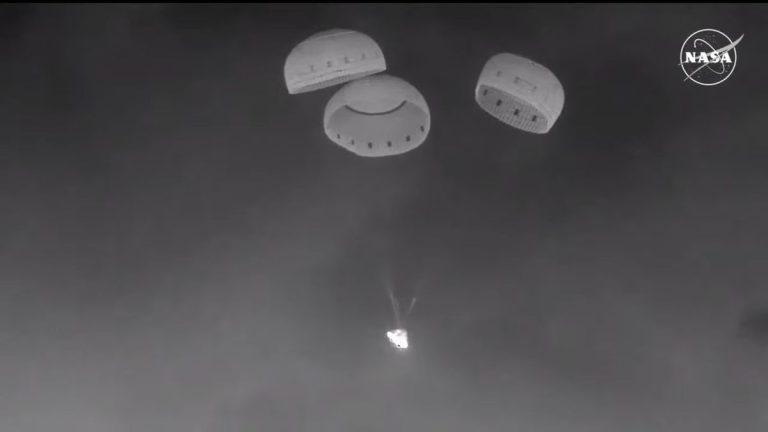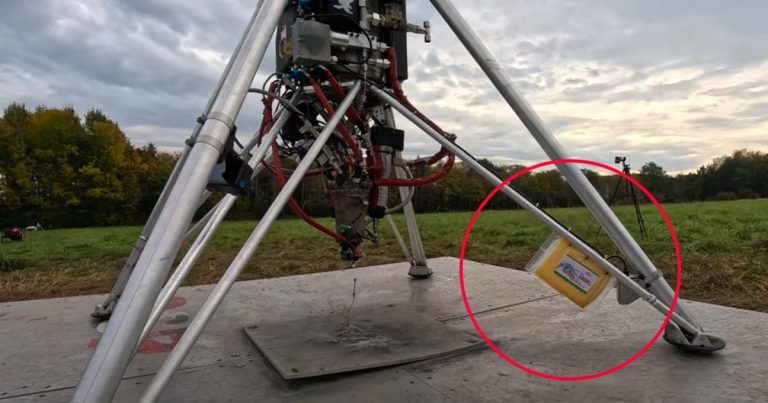
Roscosmos DG Yuri Borisov Supervised Preparations for Launch of First of 600+ Satellite Sphere Constellation (Image Credit: Payload)

Rendered into English by Google Translate
MOSCOW (Roscosmos PR) — Yuri Borisov, Director General of the Roscosmos State Corporation, got acquainted with the progress of work on the Skif project during a working visit to the Information Satellite Systems (ISS) named after Academician M.F. Reshetnev (ISS, part of the Roscosmos State Corporation). The demonstration spacecraft “Skif-D” will be launched from the Vostochny Cosmodrome in autumn and will initiate the formation of the Sphere satellite constellation.
The spacecraft is designed to form a system of broadband Internet access in Russia, including in the regions of the Far North and the Arctic. In total, the Skif system should have 12 devices and be deployed in two stages – by 2027 and 2029.
The Skif system is an integral part of the Sphere project, which will include five satellite constellations of communications (Yamal, Express-RV, Express, Skif and Marathon) and five satellite constellations for Earth remote sensing (Berkut-X, Berkut-O, Berkut-VD, Berkut-S and Smotr).
In the assembly and test building, Borisov was shown a project for a production line for creating small spacecraft for the Marathon [Internet of Things] multi-satellite data transmission system. Work stations for assembling the body of the apparatus, its service systems and payload are located in eight sections. For Russia, this will be the first experience in creating multi-satellite constellations, not only in terms of the number of spacecraft, but also in terms of tight deadlines.
In addition, Borisov got acquainted with the manufacturing process of the Gonets, Glonass-K and Glonass-K2 spacecraft, which are being created to support the Gonets-D1M system and modernize the orbital constellation of the Russian GLONASS navigation system. The first navigation apparatus of the fourth generation Glonass-K2 will be launched into orbit at the end of 2022. Compared to the Glonass-M satellites operating in orbit, it has a greater number of emitted navigation signals (nine signals versus five) and a longer service life (ten years versus seven).
At the end of the visit, the head of Roscosmos held a meeting, during which he heard a report from the CEO of ISS, Yevgeny Nesterov, on the status of current projects, as well as on promising developments in the interests of ensuring the country’s defense capability and socio-economic development.
The ISS company is the only Russian developer and manufacturer of navigation, relaying and geodesy satellites, as well as the majority of communications and television broadcasting satellites. For more than 60 years, the Siberian enterprise has created about 1,300 devices and more than 40 satellite systems for various purposes.

Fregat Upper Stage for Soyuz-2.1b Rocket Arrives at Vostochny
The Fregat upper stage designed to launch three Gonets-M communication spacecraft and the Skif-D demonstration satellite for broadband Internet access has arrived at the Vostochny cosmodrome.
The upper stage was delivered by air transport to the city of Blagoveshchensk and transported by road to the territory of the cosmodrome. Transportation from the capital of the Amur Region to the technical complex of the cosmodrome took about six hours, while for safety the speed did not exceed 60 km/h.
Specialists of the branch of JSC TsENKI, Space Center Vostochny and JSC NPO named after S.A. Lavochkin (part of the Roscosmos State Corporation) have begun preparing the Fregat upper stage for launching the first satellite of the Sphere project.
Before the launch campaign, it is necessary to carry out a full cycle of electrical and pneumovacuum tests. Within the framework of these tests, specialists of the joint calculation of the branch of TsENKI JSC – Vostochny Space Center and JSC NPO Lavochkina (part of the Roscosmos State Corporation) will check the performance of the onboard equipment of the upper stage, as well as the tightness of its tanks and pipelines.
The Fregat upper stage is manufactured by JSC NPO named after S.A. Lavochkin, and it is used as a part of medium-class space rockets and ensures the effective performance of all tasks for launching one or more spacecraft into working orbits or trajectories departing from the Earth. The entire launch process is carried out autonomously, without interference from the Earth. More than 100 successful launches have already been carried out with the help of the Fregat upper stage, more than 800 spacecraft have been put into calculated orbits.








